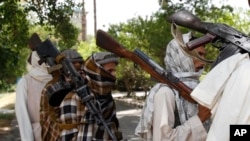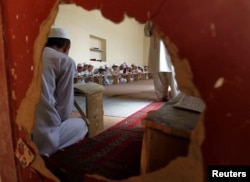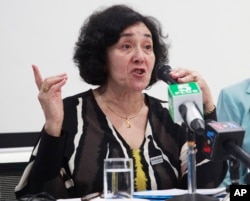An international human rights group has accused Afghanistan’s Taliban of recruiting scores of children to its ranks for insurgent activities, including the production and planting of improvised explosive devices. The militant group has denied this.
In a detailed report, New York-based Human Rights Watch demanded the Taliban immediately put an end to the illegal use of child soldiers.
International humanitarian law, or the laws of war, prohibits the recruitment or use of children under 15 by parties to a conflict, it said.
Children thrown into battle
HRW senior Afghanistan researcher Patricia Gossman says the Taliban’s apparent strategy to throw increasing numbers of children into battle is “as cynical and cruel as it is unlawful.”
“Afghan children should be at school and at home with their parents, not exploited as cannon fodder for the Taliban insurgency,” she added.
The report says Taliban forces have been training and deploying child soldiers since the middle of 2015 due to expanded insurgent operations against Afghan government forces.
It asserted that the Islamist insurgency has increasingly used madrasas, or Islamic religious schools, in the northern province of Kunduz to provide military training to children between the ages of 13 and 17, many of whom have been deployed in combat.
“The Taliban’s increasing use of children as soldiers only adds to the horrors of Afghanistan’s long conflict both for the children and their families. The Taliban should immediately stop recruiting children and release all children in their ranks, even those who claim to have joined willingly,” Gossman said.
The Taliban had briefly overrun the provincial capital of Kunduz during its offensive operations in the north in September.
The findings are based on interviews it conducted with relatives of 13 children recruited as Taliban soldiers during the past year, says HRW, adding it verified these claims through interviews with civil society activists, political analysts and the United Nations.
Taliban spokesman, Zabihulla Mujahid, in a written statement sent to reporters has denied it is adding children to its ranks.
“Children are neither recruited nor allowed to participate in Taliban jihadi activities in the battlefield or even in its administrative affairs,” Mujahid asserted.
Child civilian casualties
The United Nations says conflict in Afghanistan continues to have a devastating impact on children and it continues to record high levels of child civilian casualties.
U.N. Special Representative for Children and Armed Conflict, Leila Zerrougui visited Afghanistan this week to review implementation of an Action Plan the Afghan government signed with the United Nations in 2011 and a road map to compliance in 2014 to end and prevent the recruitment and use of children in its national security forces.
Speaking to reporters in Kabul at the end of her five-day trip on Tuesday, she said Afghan officials recognize there is a problem and they are in the process of addressing it.
“People recognize that they have shortcoming that they have lack of capacity that they are acting under very difficult and complex circumstances that they are dealing with competing priorities and they do not have always the resources, expertise and the capacity to cover them all. So, this for me is half of the work done,” said Zerrougui.






